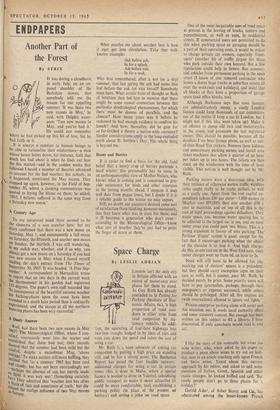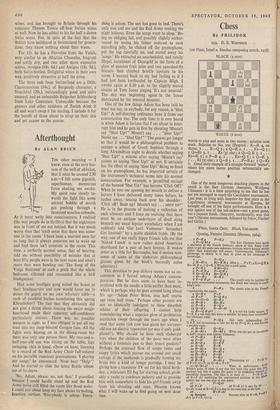Space Charge
By LESLIE ADRIAN
Mr. Roth is a keen advocate of solving car congestion by putting a high price on standing still, acid he has a strong point. The Buchanan Report has posed the four feasible answers: additional charges for using a car in certain zones (this is done in Malta, where a special licence is needed to drive in Valetta), subsidising public transport to make it more attractive (it could be more comfortable, too), establishing a parking policy (in place of the present ad /rockery) and setting a price on road space. One of the most inequitable uses of road space at present is the leaving of trucks, tankers and pantechnicons, as well as vans, in residential streets. If commercial users are permitted to do this when parking space or garaging should be a part of their operating costs, it would be unjust to charge private car owners, especially 'front- agers' (another bit of traffic jargon for those who park outside their own houses). But a few regulations could help in future. Ban commer- cial vehicles from permanent parking in the open street (I know of one removal contractor who leaves a dozen huge trucks in suburban streets all over the weekends and holidays), and insist that all blocks of flats have a proportion of garage space (and office blocks, too).
Although Buchanan says that zone licences are administratively messy, a costly London licence could keep thousands of car commuters out of the centre (I keep a car in London, but 1 might not if this idea were taken up). Make it an offence to dump old cars and motor-cycles in the street, and prosecute the last registered owner. This should be possible, because all the derelicts I see bear licence plates, as well as out- of-date Road Tax stickers. Remove these hideous and unnecessary parking meters and install area ticket machines that allow a quarter of an hour per ticket up to two hours. The tickets are then stuck on the windscreen with the time of issue visible. This notion is well thought out by Mr. Roth.
Parking meters were a disastrous idea, with their retinues of otherwise useless traflic wardens (who ought really to be traffic police), as well as a costly one. Apart from the -vast capital ex- penditure (about £40 per meter-1.800 meters in Mayfair cost £69,000), they cost another £50 a year to maintain, and on top of all this is the cost of legal proceedings against defaulters. They waste space, too, because meter spacing has to be adjusted to the largest car in use, and on most meter areas you could park two Minis. This is a strong argument in favour of area parking. The Parisian `disque' system is good, except for the fact that it encourages parking when the object of the exercise is to stop it. And high charges do this, as one can see in the West End now, since meter charges went up from 6d. all hour to 2s.
Need will still have to be allowed for (the marking out of doctors' spaces is a precedent, but they should carry exemption signs on their cars as well), but it cannot. pace Mr. Roth, be decided purely by price. Some priority users will have to pay (journalists, perhaps, through their newspapers or expense accounts), while others should be privileged. After all, fire engines are (with reservations) allowed to ignore red lights.
Private-enterprise parking alone will never sort this situation out. It needs local authority effort and some statutory control. But enough has been written on this subject to fill a library, I have discovered. If only somebody would read it, and act.
I like the story of the venerable but Vieux jea wine writer, who, when asked by his paper to produce a piece about wines to try out on holi- day, sent in an article touching only upon French and Swiss wines. Taxed about this narrow approach by his editor, and asked to add sonic mentions of Italian, Greek, Spanish and other exotic vintages, he looked baffled and said, 'But surely people don't go to these places for a holiday?'
Gerald Asher, of Asher Storey and Co., has adventured among the lekser-known French
wines, and has brought to Britain through his company Thames Tevere off-beat Italian wines as well. Now he has added to his list half a dozen Swiss wines. For, in spite of the fact that the British have holidayed in Switzerland for genera- tions, they know nothing about their wines.
For 12s. he has a Pierrefeu from the Valais, very similar to an Alsatian Chasselas, fragrant and softly dry, and two other more expensive whites, Arvigne (18s. 6d.) and Amigne (18s. 9d.), both Swiss-bottled. Delightful wines in their own way, positively attractive at half the price.
The three reds from Switzerland are a Dole, Chanteauvieux (14s.), of Burgundy character, a Neuchatel (20s.), outstandingly good and quite unusual, and an unbuyable Balgacher Schlossberg from Lake Constance. Unbuyable because the gnomes and other residents of Zurich drink it all and won't swop it for sterling. I include it for the benefit of those about to strap on their skis and get nearer to the source.







































 Previous page
Previous page